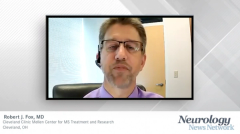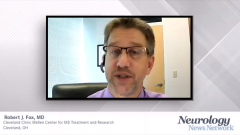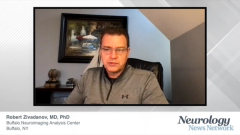
Areas of Need Within Multiple Sclerosis Research
An expert provided thoughts on the state of multiple sclerosis research, where the efforts have been directed recently, and areas that need increased focus.
Episodes in this series

Transcript below.
Robert Fox, MD: We’re still learning about the limited benefit of our current anti-inflammatory therapies, including those approved for progressive MS. They have limited benefit when there isn’t active inflammation. One of the focuses of my talk [at CMSC’s Annual Meeting] was to make sure clinicians understood that the anti-inflammatory benefits predominately benefit patients with active inflammation. These include those with active MRIs, recent clinical relapses, younger age, earlier disability progression.
The opposite end of the spectrum, those without recent relapses, active lesions and MRI, as well as older patients with more long-standing disease, are less likely to respond to our current therapies, and thus the risk-benefit trade-off of the therapies may shift in an unfavorable direction. That points out that we don’t have effective therapies for progressive MS. We need to continue to support basic science research to figure out what progressive MS is and clinical trials to test new therapies, particularly neuroprotective therapies.
These include neuroprotective therapies can either go in and protect the brain or stem cell therapies that help stimulate and deliver trophic factors for the endogenous stem cells within the brain. There is hope that some of our anti-inflammatory therapies that go into the brain may help some of the compartmentalized inflammation that may be contributing and driving progressive MS. But we’re sort of caught in this catch-22 in that we don’t know what is driving the progressive part of progressive MS and we don’t have effective therapies. So how do we develop therapies when we don’t know what drives it? And how do we know what drives it when we don’t have effective therapies that point at the underlying deficit? We have to muddle along in both directions, searching for the underlying drivers of progression, as well as the effective therapies.
Newsletter
Keep your finger on the pulse of neurology—subscribe to NeurologyLive for expert interviews, new data, and breakthrough treatment updates.














